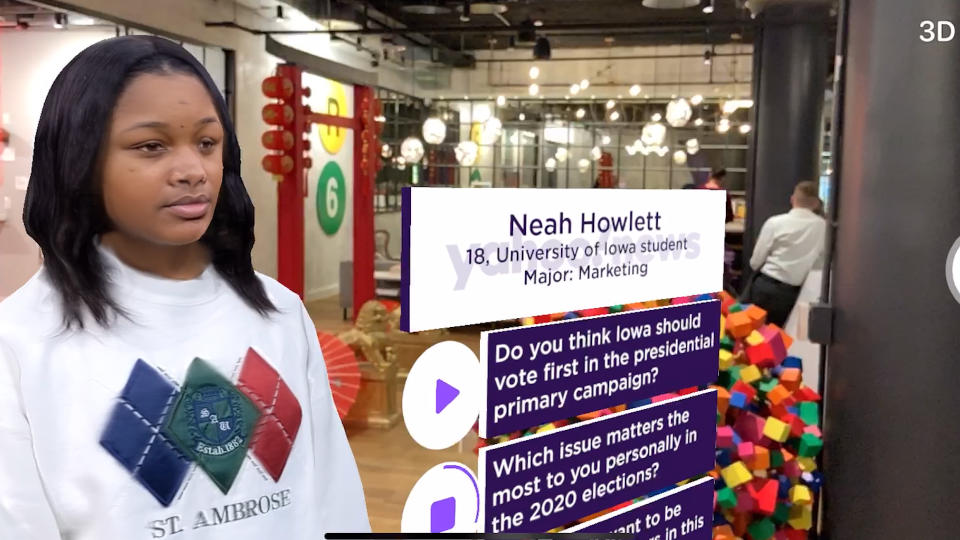Should the Iowa caucuses come first? A new generation of Iowans has doubts.

It’s been a subject of debate in Democratic circles for years: Should Iowa — the sixth-whitest state in the nation — always be the first to vote for the presidential nominee of an increasingly diverse party? Or should other, less homogenous states get a turn?
During this cycle’s Democratic primary — which initially featured the most diverse cast of candidates in history — the debate hasn’t just been academic. It has actually started to crop up on the trail in Iowa itself.
– AR Produced by Henry Keyser and Molly Hunter
In December, for instance, former Secretary of Housing and Urban Development Julián Castro went to Des Moines and told Iowans they shouldn’t vote first.
“I’m gonna tell the truth,” Castro said during a town hall. “It’s time for the Democratic Party to change how we do our presidential nominating process. … I don’t believe the two states that start the process — Iowa and New Hampshire — are reflective of the diversity of the country, or of our party.”
Castro then launched an ad — again, in Iowa — declaring that “it’s time for a state other than Iowa to go first.”
“I completely agree with Julián Castro about the Iowa caucus,” a Des Moines voter named Thomas Lecaque said in the spot.
Meanwhile, there are other signs that actual Iowans are starting to question the Hawkeye State’s first-in-the-nation status — a privilege jealously guarded by local politicians and other leaders for decades.
Roughly a month and a half ahead of the caucuses, Yahoo News traveled to the campus of the University of Iowa in Iowa City to ask the next generation of Iowans what they think — both about having their state go first and a host of other hot-button issues.
Several young voters agreed with Castro.
“I definitely understand both sides of the argument,” said Michael Aragon, 21, a first-generation Latinx-American born in Iowa. “[But] I definitely think it makes sense to have more racially diverse states caucus first and vote first in the primary because I think it’s more telling of America as a whole.”
“It might not be the most representative state,” agreed Guowei Qi, 21, a Chinese-American resident of West Des Moines whose family immigrated to the U.S. when he was 2. There are “a lot of white people in Iowa.”
“And [it’s] not that I don’t love being a part of it,” Qi continued. “But sometimes I wonder why.”
“A lot of people that are the face of America aren’t even able to attend the caucuses,” added Kaylie Wilson, 22, a white political science major. “So, yeah, I do think there maybe needs to be a little bit of reform.”
The intensifying debate within Iowa may reflect the state’s changing demographics. With a population that remains more than 90 percent white, Iowa boasts a Latino community that has been expanding faster than the state's population as a whole for the past decade. According to U.S. census figures, Iowa’s Latino population has grown by 46 percent since 2009, and projections from Woods & Poole Economics suggest that the Latino share of Iowa’s population will double to 12 percent by 2050. Meanwhile, Iowa’s Asian and black populations have increased by nearly identical amounts since 2009: 50 percent and 46 percent, respectively.
Not every University of Iowa student concurred with Castro and company about Iowa’s proper place in the nominating process. Defending their first-in-the-nation status, some Iowans who spoke to Yahoo News cited the state’s long experience vetting candidates and the seriousness Iowans bring to bear on the process.
“As an Iowan, I 100 percent think they should continue to be first,” said Carson Kephart, 21, a white biology and environment science major from Cedar Rapids. “I think there [are] some big issues with Iowa being the first in the nation, because [we’re] not super-representative of the nation as a whole. [Yet] to Iowans’ credit, they lack diversity but they don’t lack involvement.”
“I feel like we’re setting the path for everybody else,” agreed Neah Howlett, 18, a black freshman studying marketing. “It’s good that we start, I would say.”
_____
Read more from Yahoo News:


